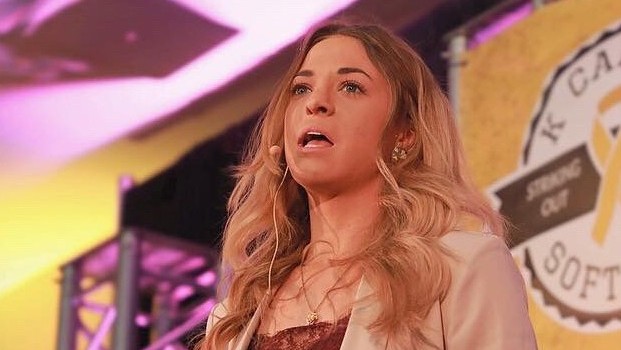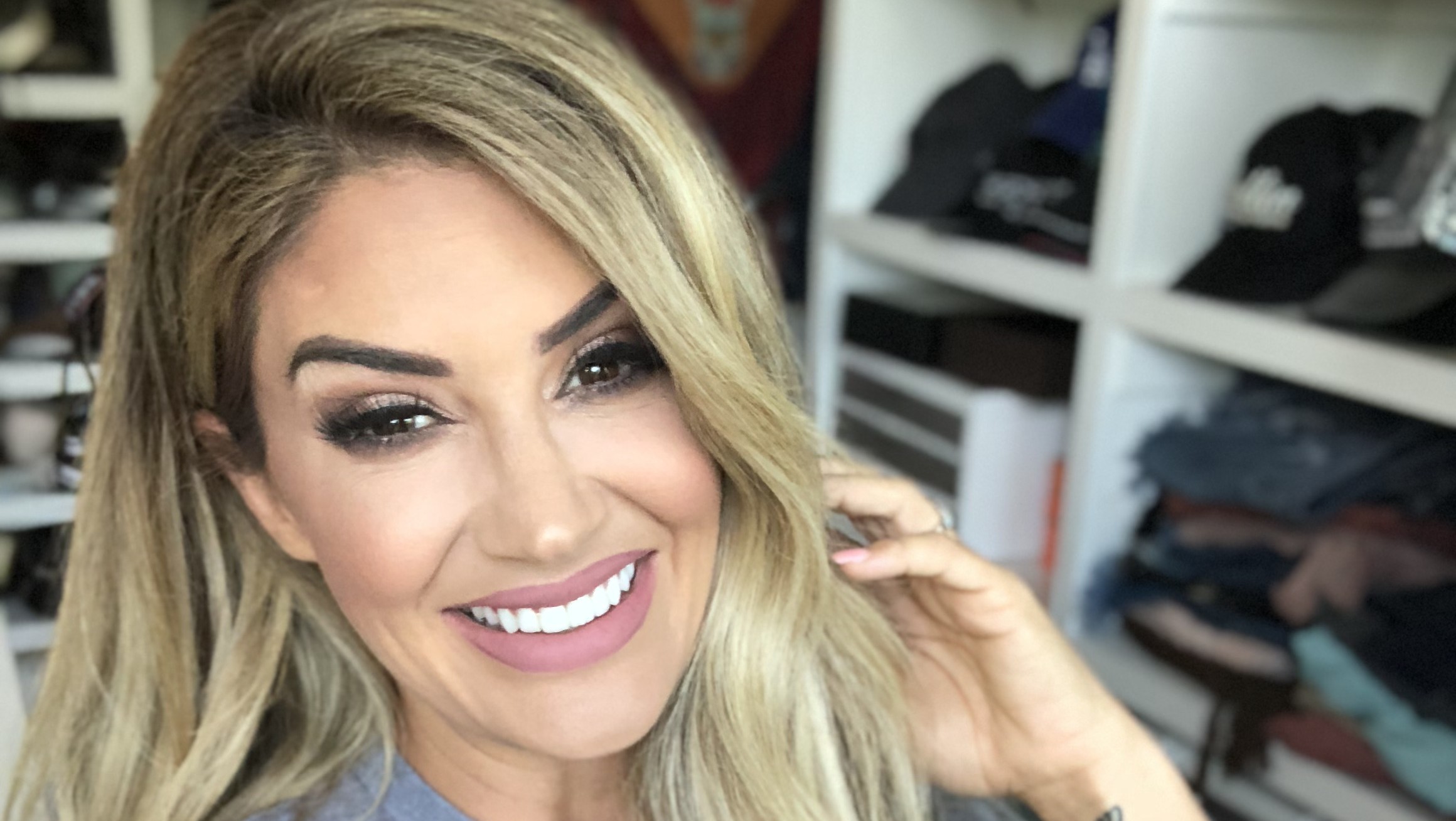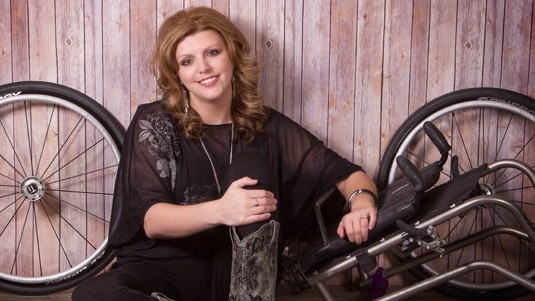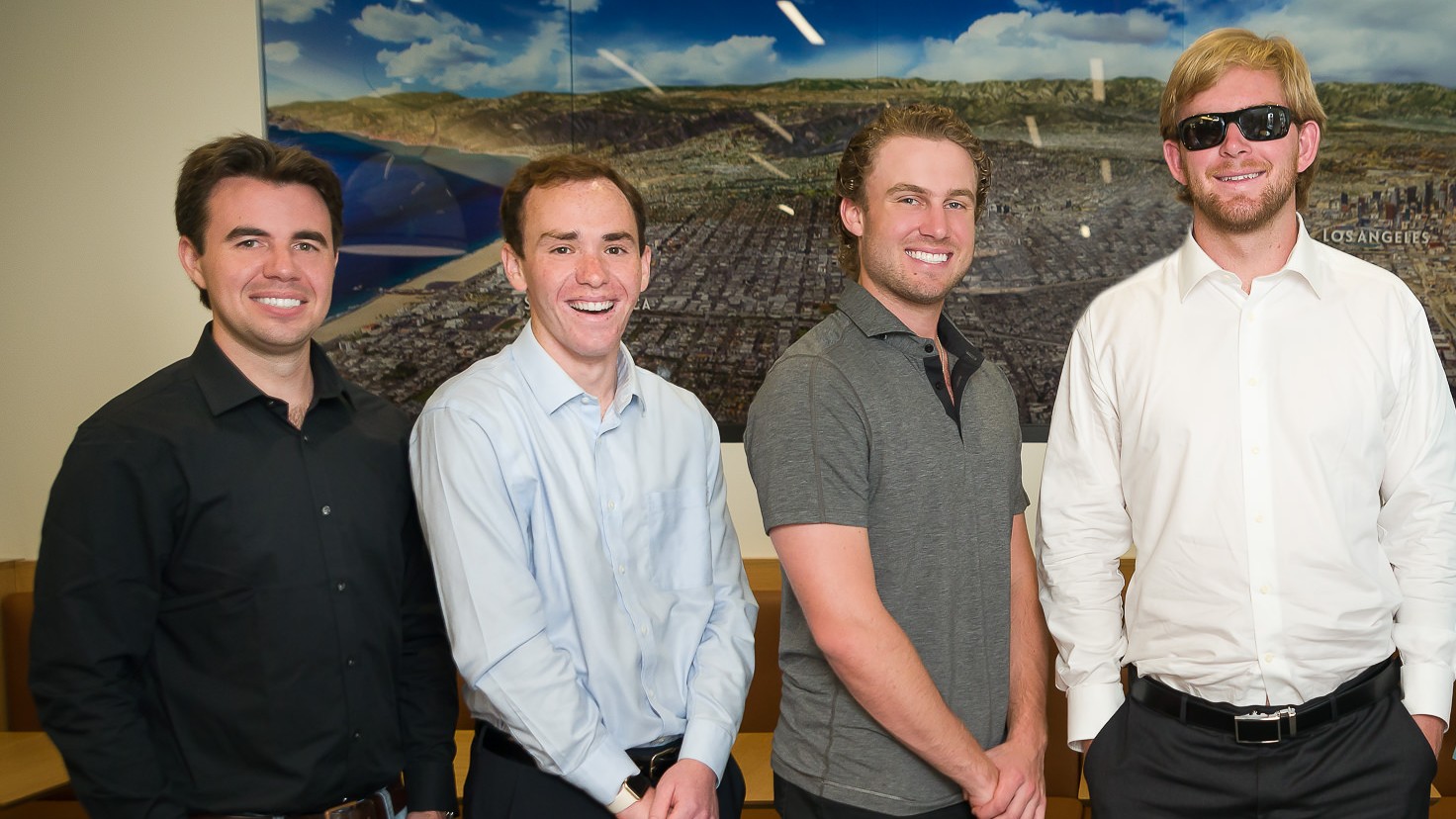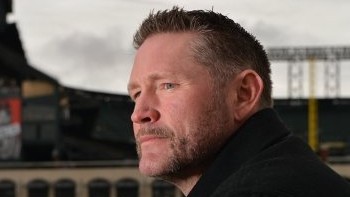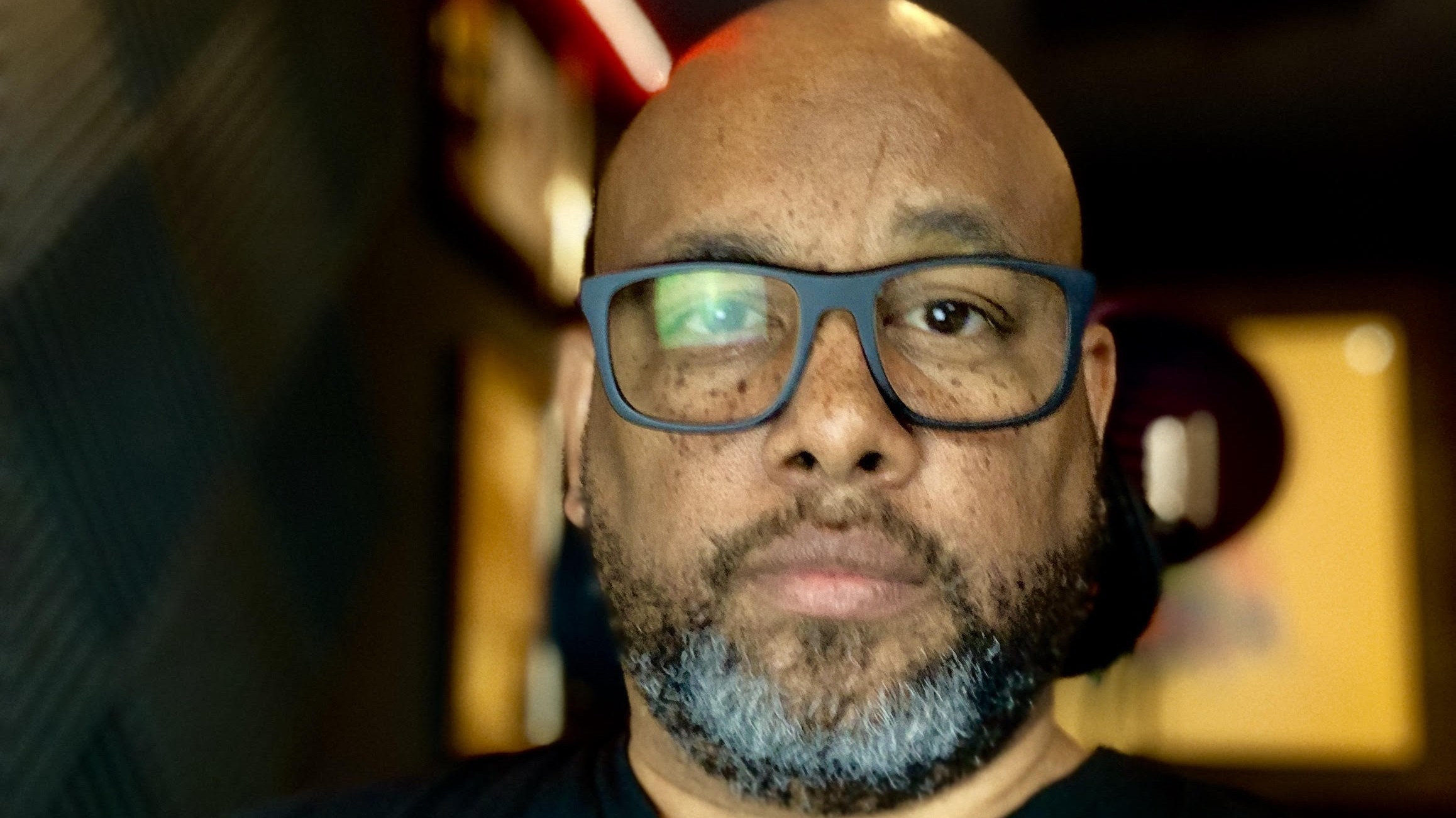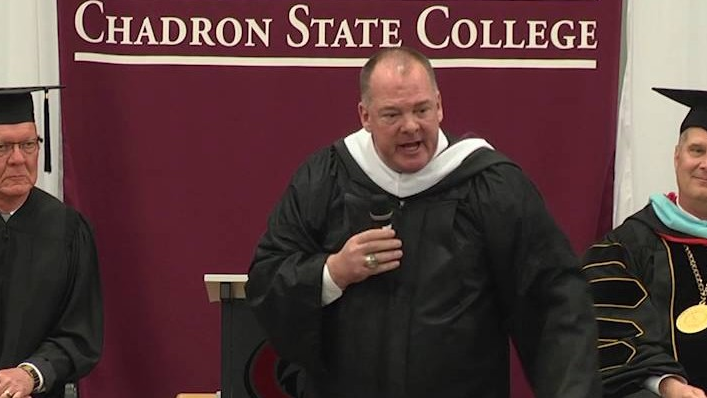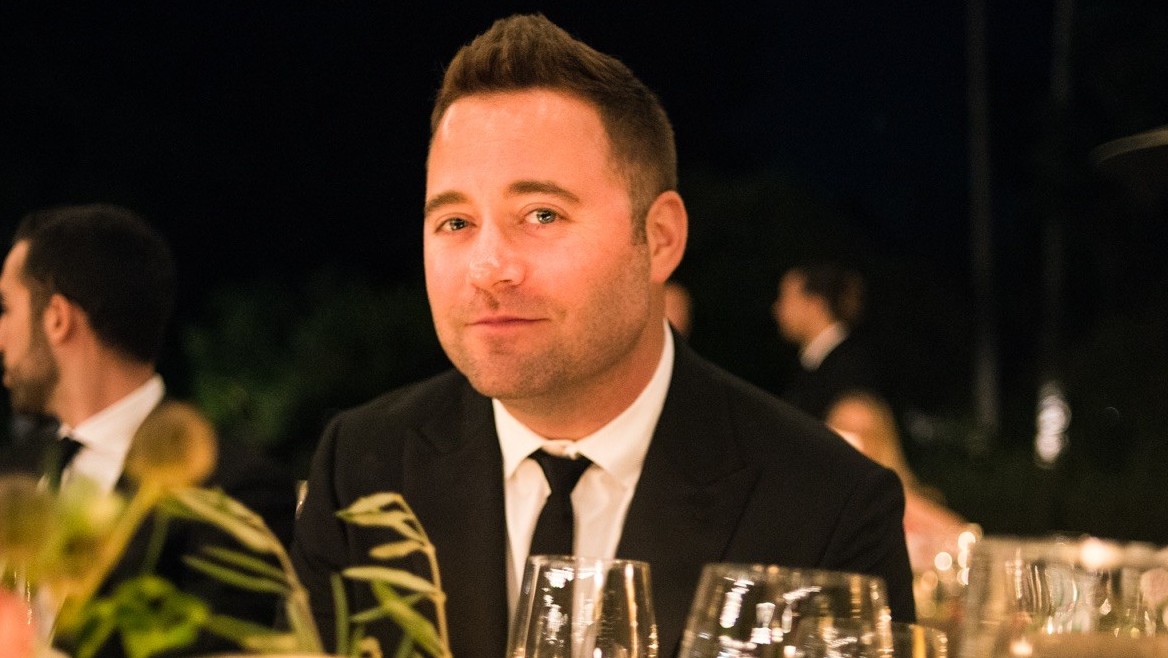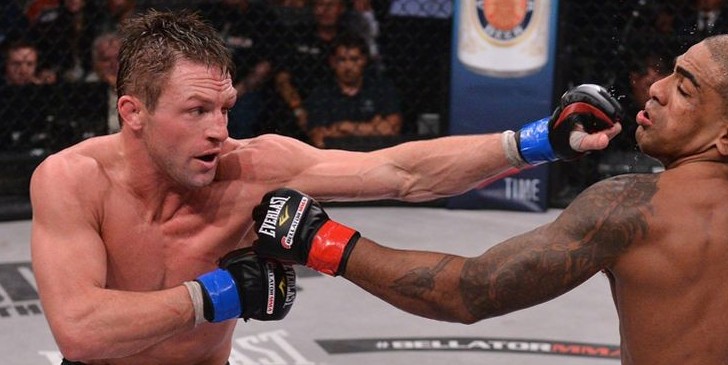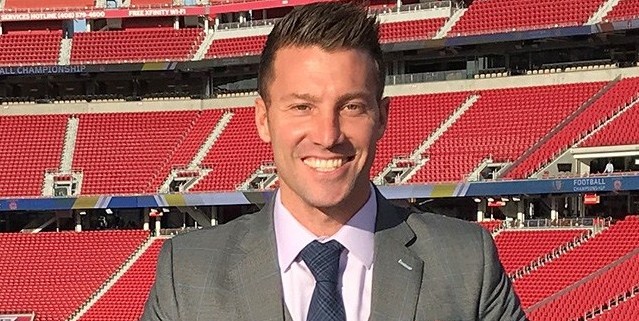
Episode 7 - Sports, Inspiration, and More - Yogi Roth
- By Brendan Egan
- Mar 18, 2019
In episode 7 of Let's Engage, Jake and Brendan engage with Yogi Roth, a Pac-12 Networks college football analyst, Award-Winning Filmmaker, Scholar, New York Times Best-Selling Author, accomplished Coach, Motivational Speaker, Media Personality, Host and World-Traveler.
Listen along with Yogi and for more information or to book him for a speaking engagement or experience, visit his profile on Engage.
--
Jake Olson: Welcome to another edition of Let's Engage episode seven. I am your host and
Jake Olson alongside with my co-host Brendan Egan. Of course we got our producer and
somewhat of a technician, Daniel Hennes behind me here. We are excited to bring you today, a
friend of mine, I've known him for almost 10 years now, which is kind of weird and to think
about, but he is an awesome, awesome influencer, all around sports, especially in college
football and high school football. Um, you probably recognize his name. Yogi Roth, thank you so
much for being with us today. I just have one question real quick. How many times do people
come up and say like, “hey Boo-Boo”?
Yogi Roth: Well, Jake, first and foremost, congratulations on everything you're doing. It has
been a gift that I’ve been given by meeting your family, your sister, your parents, you, I can
remember the first day you came to campus and calling a guy named Michael Fountain. Well,
I'm not sure if you know, but he was running college game day at the time and I said this, this
kid is amazing. Um, this is a story you should tell and I can remember. And then of course, you
know, you being a part of our program and Pete and everything that's happened since, and I
always tell people when they ask about you, nothing surprises me. I'm not surprised at all by
what you are and what you'd become. And so congrats on all that and you're just getting
warmed up, I think regarding your question, Bro. I got, I've been, that's been said to me so many
times that I actually think I actually think bro that it, uh, it gave me a pseudo edge because even
as a kid it was like hard. It's hard when you have a weird name, ask anybody who has a weird
name because of that. People are like, what's your name? How come you’re not John or Joe or
whatever? And uh, and it always still rubs me a little bit. Like I could feel like, oh, okay, you want
to go one on one or whatever right now. So it's, it's been, it's clearly a part of my journey and
part of my story and I've tried to use it positively.
J: Oh man, that is awesome. Well, I appreciate, I appreciate your, your kind words. Again, this
has been quite a journey. So you're, you're the one to blame for all of the, uh, the College Game
Day, uh, pieces they've done since then.
Y: I don't think I'm, I no, not at all. I won't, I won't take all that type of credit. Because people got
to ask questions and you've got to give them your story and...
J: I'm not giving you credit. I'm blaming you because they won't, they won't freaking quit.
Y: Okay. Yeah. Well then I'll wear that. Right. I’ll take that one.
Brendan Egan: Rough problem to have Jake.
J: I know, right? All right. So Yogi, you, so you start your college career at Pitt, right?
Y: Yes, I did.
J: As a walk on receiver. And you actually earned yourself a scholarship. So tell us about that
and tell us why did the coaches takes a long to realize what kind of talent you were.
Y: Great question. Well to paint a picture for you and everybody listening. I grew up in a tiny
town called Dalton, Pennsylvania with 2,500 people, no stop lights to this day, no stop lights.
And our high school still doesn't have soccer. The only thing that really existed was high school
football. And to get there, you got to take a big plane, a puddle jumper. And it's not necessarily
the, the place anybody's looking forward to getting to. Um, so I sit, I say that, uh, because just,
just the paint a little picture where I came from. You know, for me, my background is one that
my mom was a refugee, my dad's got an eastern philosophy throughout him and I always was
told that at 18 you have to leave the house. And I think I've always been a pseudo dreamer. And
College Football for me became something that I just fell in love with. So much so that I slept
with the football forever. You know, I slept from a, from a young age, um, until through college
and it was just kind of the heartbeat for me and everything that, that, that I tried to stand for went
through the fabric of a football. With that as the backdrop, I just wanted to go to Notre Dame and
Urban Meyer was the receiver coach then and it was me and another receiver up for one
scholarship. A guy named Rodney Rottimer and I went out to South Bend with my dad who
definitely didn't even think I could probably play at Notre Dame, uh, let alone anywhere else
cause it's a small town we came from, you never saw big time competition and I felt that I played
better than that kid and I understand why Notre Dame offered him because he was 6’4” about
230 and here I am maybe 5’11”, 180 and that moment it stuck with me and that that day when I
was told by Bob Davie and Urban Meyer, I wasn't going to get that scholarship. I made it very
clear decision on the drive home to Pennsylvania that I was going to go to whatever school
played Notre Dame the most. As pathetic as that is. And it was Pitt and the receiver coach was
a former walk on JD Brookhart. I felt like I could compete with the players there and the
scholarship guys they signed and when I walked in there it was, it was as back against the walls
you'd get, you know, they put me in a locker 106 which clearly there's no Jersey 106. I was back
in the hood with the rest of the walk ons and my shoulder pads are too big. My cleats were two
sizes larger. I had hip girdle, I'd a girdle pads that were for d-lineman. My face mask was off and
I decided that I was going to be in a relentless pursuit of a competitive edge and went with
knowledge and got lucky and played in my second game as a freshman and kind of the rest was
history in terms of getting a scholarship. But I've always felt this and I tell anybody who's walked
on that it's much more difficult and I think much more satisfying to earn a scholarship in college,
than be offered one in high school and you've seen that. You've been around that firsthand of
guys that are highly regarded, that don't have the heart that you have and uh, and it doesn't
work. And I think that's really what life's about. Leaning into what you, what you love.
J: Absolutely. Uh, that, that's really, really cool. I can definitely get on the wagon with you of
hating Notre Dame. That's an easy one. Um, so then you go to, you, you from college and you
come, you come to SC. So again, probably sticking with your, your model there of playing,
playing Notre Dame. Um, so you come to SC and you’re quarterbacks coach under Carroll, a
Quarterback Assistant, and you're, you're kind of in the glory days with the best program in the
nation.
Y: Yeah, it was awesome, man. You know, I got to come out during spring break. I would visit, I
would leave Pittsburgh and come to LA. And Pete's son, who, you know, Brennan his oldest
son, was a young coach at the time and I'd never been to California. Jake, I remember calling
my mom when I was in Manhattan beach for the first time and I was like, why didn't we grew up
here? And she never been west of you know, Ohio. So she didn't know either she was coming
from Israel and Germany and she had no idea. Uh, but I fell in love and my goal was get to
California, it wasn't even about what, it was just get to the beach. And I got close with Brennan.
He was a former walk-on at Pitt. He took me under his wing when I was there. And then when
he kicked out to So Cal, I followed and, and when I would come off for summer camps, I got to
meet Pete, Mark Jackson, people you know really well. Sark, Lane, Kenny Norton, you know,
Rocky Seto, the staff now that's who's who, you know, in college or the NFL that, that's what
Pete built. And I just got to hang with them and I played noon hoops with them. And Pete and I
would talk life and I was 19 and he and I went out to dinner with his family and we sat next to
each other and talked for three hours about competing in life. And what I think we both
recognize then was that our, our spirits were aligned. And I, and I think that we're kindred spirits
in a bunch of ways, but specifically athletically of backs against the wall, compete our tails off,
you know, being in that pursuit of a competitive edge. Prove ourselves right, not worry about
proving other people wrong. And it started and then they'd beat Oklahoma. And at 55 to 13 or
19 and he called me two days later at midnight and he, and just like you would imagine him, like
he's called you, “Hey, what's happening? What are you doing?” And I pop up in my bed in
Pittsburgh, like, Pete Carroll is calling to me. He was like, “When are you coming out here?” And
I was like, “uh, for what?” And he's like, “let's just, I don't know, figure it out.” And I was like, “all
right, but I don't want to coach, but can I go to Grad school” and I'll do anything because I saw
that coaching life of my coaches in college. And he goes, “sure, let's figure it out. Call me
tomorrow and we'll talk about it.” So we talked about it. I moved out to LA, I started in recruiting
in two weeks in and we sat down over his old, you remember that ratty orange couch?
J: Oh yeah.
Y: And uh, we had a Burrito, classic Pete style and he goes, what do you think about coaching?
And I through it, and I just tried to create value and slept in the office for two years. Just kept
climbing. I ended up doing four years on his staff. And you know, I recognize what you
recognize about SC was, it was a special place. And I recognize what you recognized about
Pete was that he's, I still think he's not a great coach. He's a thought leader. I mean, he's one of
the greatest minds, I think in our, in this century and this generation now about a lot of things
outside of just defensive football. And, uh, and we became buddies, you know, we really, we
really were able to connect and, uh, I fell in love with, with the community, Southern California,
obviously the institution and, and everything that it stood for.
J: Well, you talked about having that kind of kindred spirit with, with Coach Carroll. And I know
that, uh, you guys created Win Forever together and you know, a lot of people ask me in my
interviews today of kind of what was, was a, a, you know, a motivator when I was going blind
and in my childhood. And I point to that, that kind of mentality that you and Coach Carroll
developed together in that, you know, when, Win Forever and always competing. You know,
even when I was going blind of living a life without sight of, you know, not giving up on my
dreams and continuing to compete in that, that, that left a lasting, you know, message in my
mind and my heart that I still have today. So I appreciate you guys kind of putting your minds
together, but just talk a little about, about Win Forever, real quickly just to kind of, you know,
share that, share that mentality that again, I've, I've lived and breathed, um, because of you
guys for so long.
Y: That's really well said. Jake. I, uh, to hear you say that I get the chills because that was the
essence. You know, when I was at SC, you know, like as I referenced, I'd stay in the office late
as would Pete, you know when we would get done with our respective work we met in his office
around midnight and we had this little whiteboard, little square, probably 2x2 and on it in the
center was WF and around it we're all these ideas book, you know, the ability to teach and
coach at clinics, overarching philosophy and like a real pillar to shape, you know, and, and
guide people if they need it, a movie, a peace rally. All of these things that we ended up
checking off the list. And here I am Coach Quarterback, he's the head coach of the best team in
the country. I'm like, how are we finding time to do this? But that was Pete as you know, like he
can be, he's not a singular guy, he's not just an old ball coach. He's got much more to his spirit.
And when we would talk about it, and even in writing the book, I didn't even want to write the
book. I wasn't even supposed to write the book, but when the book was supposed to be
finished, you know, Mark Jackson and I looked at Pete and said, we're not sure if this really
sounds like it's your voice, like what's the, let's go back to work on it. And uh, he tasked me with
that and I went and finished the book now that, that people have read all over the world, but at
the essence of it was helping people be the best version of themselves. And to do that, you
have to be in a relentless pursuit of your competitive edge. You have to create value, you have
to be clear about your beliefs and your philosophy and you know, that approach that you've
lived and were exposed to when you were going through losing your sight was what Pete
crystallized when he got let go with the Patriots.
J: Yes.
Y: And I think we recognized that man, it's not just for football coaches, it's for anything. And I've
used it in my personal, professional life as you have and as have countless others. And Yeah,
man, it was literally just about what do we hope to, what does he help to lead the world and
work. And what can I do to help lift that or elevate that or articulate that? And it was really only
about helping people be the best version of themselves. But to do that you gotta be able to state
what type of person you want to be. Yeah. And that's where we really started to ideate and get
to work.
J: That's awesome. No, that's really awesome. And then for those who haven't read the book, I
really, really, really recommend it, Win Forever. It's, it's an awesome, awesome book that
obviously is easy, and changes lives. Um, but so, okay, so Yogi, so then after you coach you,
uh, you go and kind of this analyst TV personality kind of size. So what, what kind of inspired
you to do that? You just, you obviously, I mean, we can see how much you love football, um, for
playing and coaching, but what kinda got you kind of more on the analyst side?
Y: Jake, great question. Jake. Um, for me when I was in college, when I was a sophomore,
right, I would get to meet Bob Davie, Kirk Herbstreit, all the guys calling games, Chris Fowler.
Cause we were good. We were top 20. Larry Fitzgerald was my roommate. Like we were
bowling, we were, we were always on the verge. We were kind of that perennial. We were like
Auburn probably, you know, like top 10 maybe and then we lose a game. We would be top 12,
you know, we were kind of always playing in that world, but every time coaches were, analysts
would come, they'd sit and watch film and the big team room. And I'd always be there, cause I
was a nerd in football and always watching film. And I sorta talked to him and I was like Whoa,
this is a job. And they'd be like, yeah, this is what we do. And I'd be like, Oh okay. You know
how it is, you're, you're that age. And we didn't have the Internet really. Like it was called the
Facebook. And Pitt was one of the few, I think it was the top 20 schools to get it when I was
there. Internet was kind of old school wasn't great. So you didn't really know a lot about the
world and specifically around entertainment like people do now. Like you could go to a
production team because Gameday’s instagram video takes you there. You didn't get to do that
in our era. So I start to ask them questions and they would ask me questions and I learned that
if I gave them a little bit of our game plan to help their broadcast, they would give me advice. So
I started to meet the aforementioned Michael Fallon, O’Garrett, Ed Placey. All these rock stars
and on my spring break instead of going to Cacun and ripping it, I go to Bristol and I'd spend a
couple days up there. On my winter vacation, I'd go up there and watch the control room talk
about the Heisman, and I sat down and was like, this is dope. And then in the season on Friday
production meetings when those analysts talked to Clay Helton and Clancy Pendergast, et
Cetera, I would sit on those meetings. So I started making friends. So much so Jake, the way I
got in Michael Fountain calls me and says, tell me about Matt Barkley, right? Sanchez leaves
early, the college football world's wondering what's going on
J: Right.
Y: Matt Barkley is, the high regarded freshmen from Orange County and he knew that I would, I
knew Matt and I said, I'll tell you all about him, but put me on TV and he goes, excuse me? I
said, yeah man, I don't have a job. Put me on air and I'll tell you everything you want. And he
goes, Yogi, this is ESPN. You got one chance. And I said, I don't care. And they gave me a
chance and I went on College Football Live and started talking about quarterbacks like every
Tuesday for two years, didn't get paid, which was probably like illegal in terms of HR. And I was
like, I get, I need exposure, I got to hustle. Like all the same stuff that Pete taught me you when,
we were at SC. It just busted my ass and just kept trying to find angles in it.
J: That is, that is, that is really, really, really cool. Um, yeah. So then obviously you then you
kind of take on this role and the creative side kind of comes out of you, which I think is one of
the more special sides of you, a Yogi. And you start kind of creating these shows. Um, you
know, three, three for the, for the show is kind of your first one. Talk to kind of about following in
a Locker, a Newton and Tyrod, kind of as a, they go in and obviously sticking with the
quarterbacks?
Y: Yeah. So you, you learned this, um, because you've had access to locker rooms, you know,
your whole life for the most part. And I didn't realize that that was a skill. So I finished coaching
and Sark takes the head coaching job at Washington, offers me to coach the quarterbacks. I
have my come to Jesus moment. I'm 26 at the time, offered a six figure job. My family never had
six figures like I, it would have been awesome. But there was something inside of me saying it
ain't right. You know, and it wasn't him. He still like a big brother to me. Uh, but I, I didn't want to
live the life of a coach where I was moving every year. And your, your pseudo living the same
story, you know, with different beats and different characters. But I didn't want to do that for 30,
40 years. I wanted to see the world and I wanted to travel. I've always had that bug and that itch
of like the world's big man, like nobody knows what football is and you know, in the middle of
South America, like they have no clue they're learning now. But back then it wasn't a thing. So I
wanted to see the globe but when I came back I still wanted football to be my life in the season.
Well Espn was creating a documentary series, um, uh, really a documentary collective around
quarterbacks and it was called the Year of the Quarterback. So their whole platform is all about
quarterbacks cause that's where the quarterback rating came from. That's where a ton of
content on QBs came from. It's really the first time in entertainment where a network doubled
down on one position. So I knew the head of content and her name is Joan Lynch who was a
mentor of mine and one of the few still to this day, executives that have believed in me. And she
said, hey, we're trying to do a doc. I said, well let me think about it. I talked to Sark and he goes,
you should follow Jake. And Jake just turned down being the number one or number two pick in
the draft to come back. So he turned down 20 million bucks to be a Senior. So I went up there
and we pitched the series and we were with an acclaimed director, Jonathan Hawk, who at the
time I knew nothing about, I just, he knew how to turn a camera on and put it together. And I
realized my skill was getting access and what I learned throughout the process that knowing
how to navigate a locker room, talk to coaches, talked to families, know when to get out, when
to hide in the corner. That's a real skill. And that's called a producer. Like people get paid for
that. So I said I'll produce and you teach me how to make a film. And that was the beginning of
my filmmaking, storytelling career of I don't know how to turn the camera on. I don't know what
lighting is. I don't know how to do audio. I don't know how to edit, but I know how to do access.
And that's what started it so that we followed Jake and that blurred into Cam Newton and Tyrod
Taylor as you referenced. And uh, they went nuts and it was really cool cause we were the first
doc. We're the first, we're the first film in the history of television, sports television to mic up a
college athlete in a game. It was probably, we didn't run it through compliance and everybody
that you probably should have, but we mic’d up Jake Locker for his final game and I get a note
from his dad every year saying, I watched it back. Thank you for capturing his senior year. And
uh, it was beautiful. It was really fun for me to lean in. And from that point, I think I've done over
20 films now where if you get access and respect access, you can tell a beautiful story and
that's become a real passion of mine.
J: That is awesome. When is the drive going to do USC?
Y: When a USC says, we'll give you access all season.
J: I, I'll, I'll, I'll try to work on that. Man. It's uh, they, they just cut my access off so, you know,
we'll, we'll try to try to work on that together.
Y: Yeah, well, it's a tough thing, right? I mean, you know, and I always say this is a storyteller.
We pitch programs all over the country every year. And in that part of storytelling is kind of
dying, you know, like, cause cause schools give so much access on their own channels now.
But to me it's about the storyteller, right? So if I can come in, they're crafting Jake Olson’s story
is a beautiful challenge and something that we all want to do. To me, crafting the story when
something negative happens to a team is where coaches have to trust you. And that's the hard
part, right? A kid gets arrested or kicked off the team, things that just naturally happen
unfortunately around the country and that's unfortunately it's a that's true.
J: Um, what about, I remember speaking to you about what, eight months ago maybe or so, um,
and you're, you're really working on life in a walk and kind of tell us about that. How, how special
that was with your father?
Y: Well, Jake, that gave me, that changed my whole life, you know. Um, I recently got engaged
and uh, I think the process began then, um, with being around my dad and being able to be
really vulnerable with him. Uh, so bottom line for people who don't know the story, my dad was
diagnosed with prostate cancer in 2004. He never dealt with it until 2009. And I never dealt with
it either until 2013. Um, it was something I just pushed to the side. It's something that I was like,
oh, he'll be fine. And then one night, I mean, living in my home in Venice and I was watching a
movie and thinking about my next adventure, where am I going to travel to? And I watch this
movie about this famous walk called the Camino de Santiago, which is a famous walk through
France and Spain and Portugal and it is a very spiritual walk. And I'm like, I'm going to do that.
And then it hit me like a ton of bricks. I don't know if you've ever had moments like this where
you're overcome with emotion. I started to bawl and I'm like, I never dealt with my dad being
sick. And Oh my God, I have so many questions about life and his life. So I flew home the very
next weekend, I flew to Brooklyn where my sister was living at the time and I walked into the
living room and I said, dad, I'd like to go for a walk with you and we'd love to walk as a family.
And he goes, sure, where are you thinking? Like prospect park around the corner? And A, I
said, no. I said, here's a plane ticket. Um, I'd like you to meet me in Madrid and we're going to
walk this famous walk. And he's like, uh, looks at my mom, like, do I get the okay, you know,
and uh, she gives him as okay. And away we went. And at the time I had sold the travel show
and the production company or I tried to create a travel pilot. And the production company said,
Hey, we'd love more footage of you that isn't your iPhone or your smartphone or your shaky
camera operation. Can we come with you on your trip? And I said, sure, I'm going to this walk
with my dad. And the production company said, okay, we'll pay, we'll take care of all the
cameras and all that production. Let's just find some money for travel. And when we come back
we'll see what type of content we have. And Jake, we landed and the production companies
sifted through all the content and they said a Yogi, a, it was a great trip. We had a great time.
You and your dad are awesome, but we don't think there's a movie there. And I said, okay, do I
get the content? They, said yeah, do whatever you want. And I went home and edited what I
thought was going to be a home movie. And when we put the trailer out, it went bonkers. And all
of a sudden, I'm getting calls from USA Today, men's health and all of these features on our
film. And what I recognized is our film was basically about me going through my dad's life. We
went through a different decade of his life as we walked 15 to 22 miles a day. What I recognize
that so many men that is specifically are like us and athletically minded. We are taught for
whatever reason that it's okay to cry after you win the title like Michael Jordan or Russell Wilson.
It's okay to cry if you lose a championship. It's okay to cry in sports, but it's not okay to get
emotional anywhere else. And I was that prototype and when I learned was it, majority of men
are like that, that are jocks that grow up around sport. So our film, we think that we unite fathers
and sons and family members and special ways, but most importantly we try to make it okay to
have the conversation around emotion and being vulnerable. And uh, it, it literally changed my
whole life, Bro. Like the only thing I ever loved was football. And after that I clearly began to
have different passions and like I said, off the top, I think it began the process of me meeting my
now fiance.
J: That was really, really cool. That's special. Yeah. I, I've been meaning to go watch it. And I
really, really, um, you know, I think that'd be impactful for my relationship with my father as well.
So I'll, I'll hit you back up when I do and I think it's going to be something special. Um, where did
the passion come from to go and kind of help high schoolers and kind of with this elite 11 thing?
Y: Yeah, it's one of the most favorite things I get to do. Um, you grow up as an athlete and all
you want is people to breathe opportunity into you, right? Like you've had a coach to probably
said, Jake, you can't play football. And then you'll have somebody say, yeah, go for it. And if you
didn't, you just are headstrong and you rally. But at some point you need, I think as an athlete,
somebody to say, I believe in you. You know? And, and I didn't have that for a long time. Um,
and I remember when it did happen and a lot of it was even when I was with Pete and I
remember being like, man, if I had him as a coach, I might still be playing, you know, whether it
was arena football or you know, practice squad. But he breathed life into everyone, specifically
chip on the shoulder athletes and being around SC as you know, they, it's a hotbed of
quarterbacks. Yeah. So I was the guy that was holding the quarterback's hand, whether it was
Jimmy Clauson are huge recruits around the country when they would come. Tim Tebow. So I
got to meet everybody and then being with Sark, I got to really learn how to teach that position
and understand it. And when I left the founder of elite 11, who was, his name is Andy Bark, he's
a mentor of mine, planned out a really good beat in the offseason. He was one of those coaches
that I met when I was in high school that believed in me. He ran the Nike camps around the
country, excuse me. And I went to the first one. It was at Penn state. And I always remembered
him being like, wow, this guy giving me, gave me a chance. Like he kind of believed in me and
he probably didn't know me from any other, you know, 5’11” white wide receiver that showed up
at his camps. But I fell for this guy. Anyway, Elite 11, this was 11 years ago now, was not what it
is today. It was a really cool camp. It had the best guys. It wasn't about the competition but
about the teaching. But it still had this blueprint that when Andy asked him about it, I said, I think
it's American idol for highschool quarterbacks. And he said, all right, well do you want to be a
part of it? Why don't you do an audition? And it was the same deal or a year as the year of the
quarterback. So I went and did my audition. I was at TCU, I remember the, his name was Mitch
Wright. And I had to like win him over. And I realized that, uh, I know how to talk to these guys.
And it was really fun to be, you know, the pseudo host slash coach role where you're mentoring,
you're guiding, you're provoking and you're learning about TV and it's getting aired all over the
world and coaches that year were actually banned from calling. So they needed to talk to
coaches about, hey, what's so and so like, what's Aaron Corp play? What's Mitch Mustain like?
What's Matt Barkley like? And I was like, I got you. And I was trusted. So I leaned into it and fill
them up. And then when Trent Dilfer came on board, we took it to a totally other level. Uh, and
now it's in its 21st year. It's my 11th year. I just kicked it off over the weekend. And, and I get
great joy in meeting young men like Trevor Lawrence, like Tua Tagovailoa, just household
names or guys that nobody ever heard of that never played with meeting them at 16 when the
world and the pressure of the world, I should say is on their shoulders and they don't know how
to deal with it. And I love being around them and trying to just give them a few tools that they
could take to college to get developed by the coaches there to help them in life when it's hard.
And then when it's over, I talked to so many guys now that are done planning and I guide them.
You know, I do all the one for over stuff that you've been through and I coach them on how to
find their passion. So it's really, you know, nobody makes any money on it. We just love it. We
love the craft of being around when I think are the CEOs of sport, you know, the best in class
and being a part of the life. So I, I'll do it. I hope for the rest of my career.
J: That was awesome. No, it's, there's someone who, you know, not as a quarterback, but I've
been a high school over again where you kind of have that, those coaches both telling you you
can't. And those who tell you can, that the, the, the ones who are there for you make, make the
world of difference. You know, the, the coach coach Viselmeyer helped me learn a longsnap
obviously changed my life. So we as, as I'm speaking as, as high schoolers in those positions.
Yogi, we, we appreciate that. Um, so now, obviously you, you, you talked about your creativity
man, so you love to speak. I learned this today man. You did a Ted talk.
Y: Yeah, yeah. I, yeah, I, I'm always been speaking, you know, and I wasn't even in elementary
school. I would do like the, like the mock trial team, you know, I ran from, I was the president of
my class student council like a whole thing, excuse me. I've always really loved to perform. Uh,
and I think as an athlete when your career is done and you're not performing anymore, it's hard.
It's hard emotionally because you have identity issues, but from the muscle of performing well
and that's not there anymore. That is hard. Especially if you loved performance. And I played
football, not because I fell in love with it or my dad told me to play. I loved it because the most
people went to games and I was like, it's really cool and like 5,000 people cheer for you in high
school. All right, I'm going to get good at this. And, and I loved the performance side of it. And
then when I was in LA, I don't think I've ever even shared this, but when I was an SC coaching
and till to this day, I take acting classes once a week.
J:Really?
Y: You live in, we live in Hollywood. So why wouldn't you? And as a performer, I'd love being
coached as an actor to help me as a broadcaster.
J: Yeah absolutely.
Y: I think because the number one thing in acting is you need to listen like your life depends on
it. As an analyst on games, I need to listen like my life depends on it, right? I mean, listen to my
play, my play partner, I don't need to listen to the crowd. I got to listen to, to your body language
when Clay Helton brings you over and whispers in your ear. Right. You know, so that I train that
as an actor and loved the performance side and then speaking, well that's easy. You know, and,
and I didn't realize it at the time, but we have a mutual friend, named Keith Sarkisian who's a
music agent and when I left coaching goes, I bet to the rest of your career people are going to
start off asking you about what it was like in your time at SC. And I was like, no way. I'm more
than that. But that's not true. And everybody just wants to know whether it's leadership style,
conflict, all of that. So I began to speak and much like coaching you love watching people grow
and evolve or challenging or even fail. And I’ve bombed on stage. So it's kind of fun and I just
am trying to look in my life for as many moments where I can replicate playing again. And as an
analyst you only get 14 games or so you know, I have 80 shows a year. I would do 300 shows a
year. I mean that might be a little aggressive, but I'd love to perform, you know, as much as
possible because I get fed off of that.
J: Oh yeah. No, I know exactly what talking about. I said it's a thrill to be up on stage with
everyone here and everything you have to have to say. It's um, so I appreciate, appreciate that.
Take right there. Um, well Yogi, we appreciate you being on today. Talking about speaking you
can find Yogi’s profile on letsengage.com. As you can tell, he's an awesome, awesome man of
many, many talents. And he is awesome for high schools, colleges, corporations, groups,
anything. He's got an awesome mindset with Win Forever, an awesome story and really can,
uh, put, put in a, uh, a motivation that not, not many other people can. So Yogi I have one last
question I guess. And look, we, we record this so we can, we can bleep it out if you really don't,
if you don't want people to know, but you know, being obviously going to Pitt, but you're here
working with the PAC-12 a lot. We know, we know you root for USC. You know.
Y: I think that when USC does well, it is awesome for college football because a lot of the
people on the east coast that you've met at other places, um, or even just the general media,
they don't necessarily always do their homework and pay attention to the west coast. And you
don't have to bleep that out man. I think that's the truth. So when SC does well, there's more
eyeballs on the PAC-12 and it's better for the PAC-12. And I love it when it, when the coli’s full,
you've been there man.
J: Oh, yeah
Y: It's, it's, it's one of the coolest places. Not In college football, but in the history of sports. So I
want SCto roll. I can't wait for them this season. The redemption story, I'll be calling a bunch of
their games on the PAC-12 networks, but my partner Ted Robinson, I love it. I love the Trojan
family is different. And, uh, and I believe that being at so many different schools around the
country, uh, and I can't wait to see him bounce back then, you know, spend anybody, it's hard.
It's hard to compete there. Um, and a lot of times you can have a false identity of who you think
you are. So I hope last year season, uh, you know, got in those players heads and now they're
like, hey, let's go to work.
J: We will see, well if you need any help analyzing the season or a sideline report, let me know.
I'll, I'll be at the games. So I love it. I'll be get their Spring game and then uh, we'll make sure we
got to record you on my podcast man and a bounce back and forth. This is fun.
J: Yeah, absolutely. All right. Yo, you will. Thank you so much again. To find Yogi, you can go to
www.letsengage.com and book him for an experience of your choice. He is amazing. You can
also find the rest of our talent list there at www.letsengage.com and we thank you again today
for listening to the Let’s Engage podcast, till next time.

